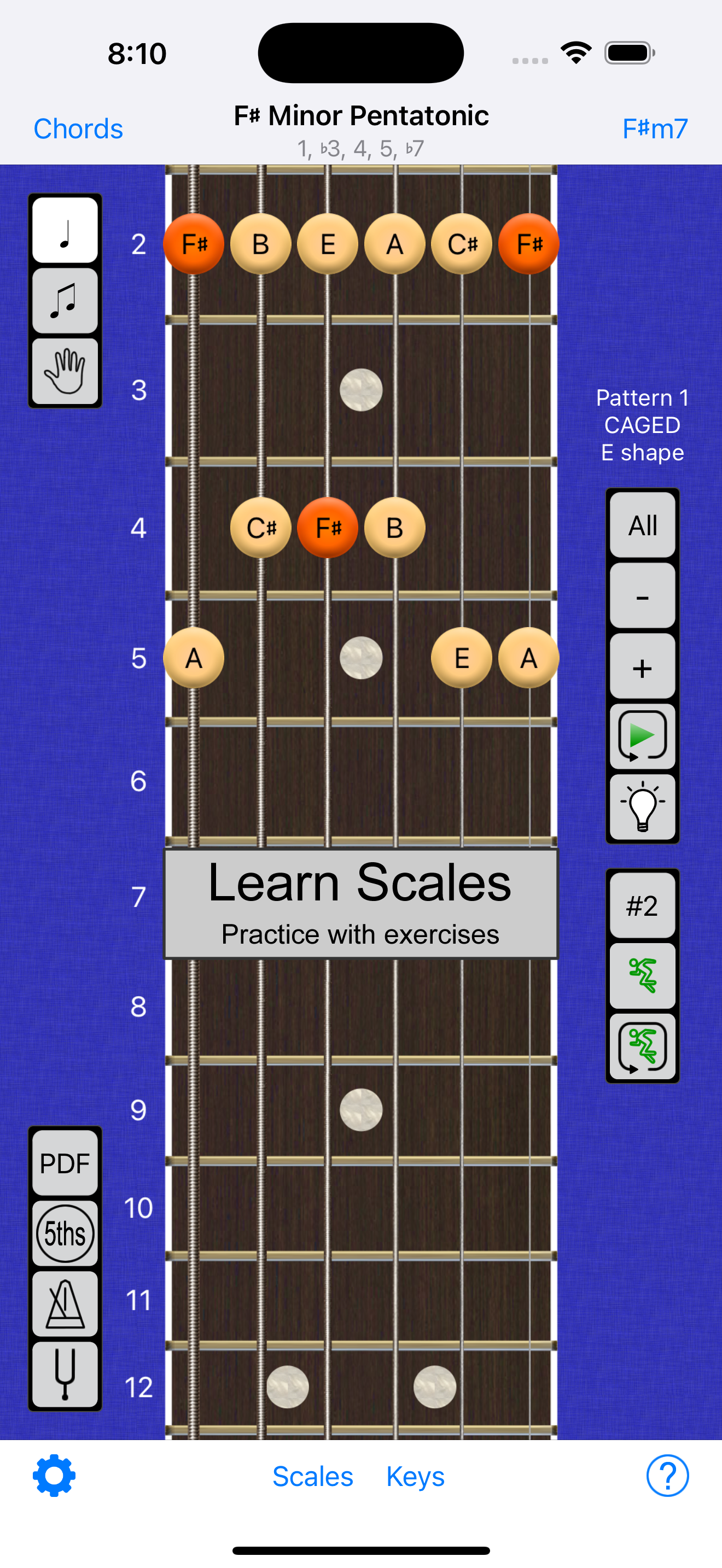You’ve hit your search limit
Start your free trial to keep exploring full traffic and performance insights.
Get Started- Home
- Free App Analytics
- Guitar Scales & Chords Power
Guitar Scales & Chords Power app analytics for January 12
Guitar Scales & Chords Power
- Thomas Gunter
- Apple App Store
- Paid
- Music
To improve your guitar playing, learn scales, chords, and the relationship between them. Stay in tune with the tuner and enhance your rhythm by practicing with the metronome.
Practice scale loops to master positions and develop muscle memory. Engage in scale exercises that will improve your finger dexterity and ability to improvise. Begin slowly and gradually increase your speed as you improve.
Play scales and chords by swiping across the strings. The direction of the swipe determines whether the playback is ascending or descending. Tap on a note to play it.
Scale positions correspond to the CAGED system, which consists of five patterns that cover the fretboard for each scale. The chord shape for each position is displayed to assist you in learning it in any key.
The tuner offers a chromatic mode or the option to select from various tunings.
The tuner and instruments use an adj. reference frequency, set to 410 Hz - 470 Hz (default A = 440 Hz).
The Circle of Fifths displays common chords for a key, aiding in composing music, learning key signatures, and transposing songs to different keys.
Metronome provides click and drum voices, beat subdivisions, and tap to set the BPM (10 - 400). Time signatures: 2/2, 1/4, 2/4, 3/4, 4/4, 5/4, 3/8, 6/8, 7/8, 9/8, and 12/8.
Create PDF diagrams (color and black-and-white) of scale positions or all notes on a full fretboard, as well as diagrams of all chord notes on a full fretboard. These 8.5” x 11” PDFs are easy to print, save, and share.
FEATURES:
• Chromatic tuner
• Scale position and exercise loops with adj. playback speed
• Chord and scale information, including their compatibility
• Chord/scale notes display letter, interval, and fingering
• Chord/scale playback - choose from 5 instruments and set them independently
• Count-in option before scale playback
• Play scales and chords together to hear them in combination
• 48 alternate tunings
• Guitar display (vertical/horizontal and right/left-handed)
• iPhone - zoom in/out to see the complete fretboard
• iPad - 3 fretboards: full, scales, and chords
• One-time purchase usable on iPhone, iPad, and iPod touch
SCALES:
Pentatonic etc:
Major Pentatonic, Minor Pentatonic, Blues (Minor Blues), Major Blues
Major modes:
Ionian (Major), Dorian, Phrygian, Lydian, Mixolydian, Aeolian (Relative Minor) and Locrian
Harmonic Minor modes:
Harmonic Minor, Phrygian Dominant (Spanish Gypsy)
Melodic Minor modes:
Melodic Minor Ascending (Jazz Minor), Dorian b2 (Javanese), Lydian Augmented, Lydian Dominant (Overtone), Mixolydian b6 (Hindu), Locrian #2 (Half-Diminished), Super Locrian (Altered)
Symmetrical:
Chromatic, Half/Whole Diminished (Octatonic), Whole/Half Diminished, Whole Tone
Miscellaneous:
Bebop Dominant
CHORDS:
Major:
Major, Major 7th (maj7), Major 9th (maj9), Major 13th (maj13), Major 6th (6), Major add9 (add9), and Major 6add9 (6/9)
Minor:
Minor (m), Minor 7th (m7), Minor 9th (m9), Minor 11th (m11), Minor 13th (m13), Minor 6th (m6), Minor Major 7th (m(maj7)), and Minor 7th b5th (m7b5) (Half-Diminished)
Dominant:
Dominant 7th (7), Dominant 9th (9), Dominant 11th (11), Dominant 13th (13), and Dominant 7th sus4th (7sus4)
Altered Dominant:
Dominant 7th b5th (7b5), Dominant 7th #5th (7#5), Dominant 7th b9th (7b9), and Dominant 7th #9th (7#9)
Other:
Augmented (aug), Diminished (dim), Diminished 7th (dim7), Perfect 5th (5) (Power Chord), Suspended 2nd (sus2), and Suspended 4th (sus4)
TUNINGS:
Standard, Std. Half Step Down, Std. Full Step Down, Drop D, Drop C#/Db, Drop C, Drop B, Drop A#/Bb, Drop A, Drop G#/Ab, Drop G, Drop F#/Gb, Drop F, Drop E, Double Drop D, Double Drop C#/Db, Double Drop C, Open A, Open A Alt., Open A Slide, Open C, Open D, Open E, Open F, Open G, Cross-note A, Cross-note A Alt., Cross-note C, Cross-note D, Cross-note E, Cross-note G, Asus4, Csus2, Dsus2, Dsus4 (Dad-Gad), Esus2, Esus4, Gsus2, Gsus4, E Modal, Bruce Palmer Modal, All Fourths, Baritone, C6, Dad-Gad (Dsus4), Dad-Dad, Dobro, Lute, New Standard

Store Rank
The Store Rank is based on multiple parameters set by Google and Apple.
All Categories in
United States--
Music in
United States#188
Create an account to see avg.monthly downloadsContact us
Guitar Scales & Chords Power Ranking Stats Over Time
Similarweb's Usage Rank & Apple App Store Rank for Guitar Scales & Chords Power
Store Rank
Rank
Guitar Scales & Chords Power Ranking by Country
Counties in which Guitar Scales & Chords Power has the highest ranking in its main categories
No Data to Display
Top Competitors & Alternative Apps
Apps with a high probability of being used by the same users, from the same store.
Guitar Driller
Dmitrij Pavlov
FretFinder
Sean Oreilly
Guitar Gravitas: Total ed.
Mad Harmony Inc
Triad Trainer for Guitar
Atomic Bytes LLC
January 12, 2026